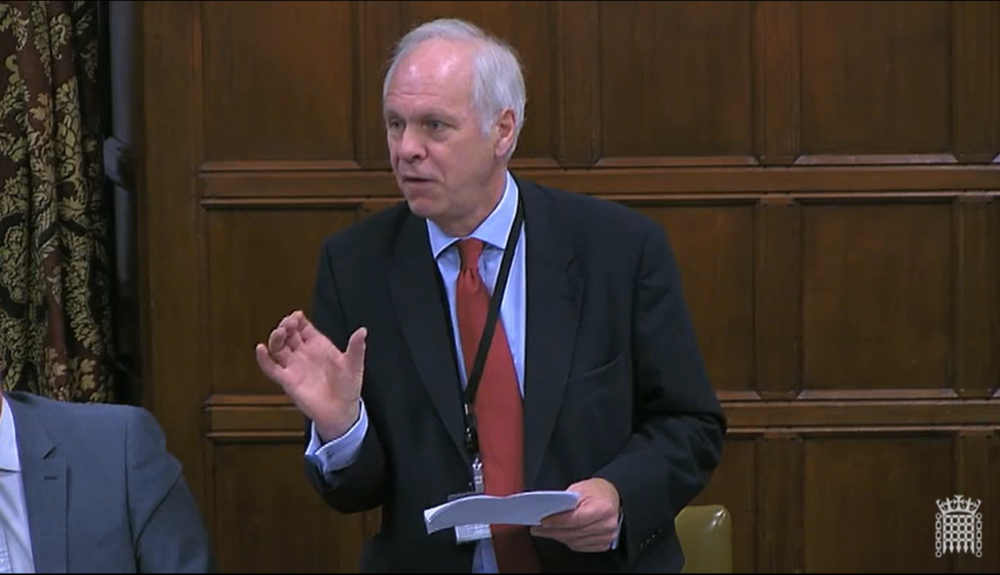Cancer Drugs debate on 19th October 2015

On 19th October 2015, Westminster Hall sat down to debate the availability of cancer drugs with a lot of discussion about Abraxane, the first new licensed drug for pancreatic cancer, being removed from the Cancer Drugs Fund with the petition being listed as one of the supporting documents.
Impassioned pleas were made to the minister, George Freeman, by a number of MPs, who spoke about the importance of providing pancreatic cancer patients with drugs to extend their limited survival.
Jim Shannon, DUP MP for Strangford, introduced the debate raising the concerns of the house. He listed a number of news headlines highlighting the widespread condemnation of the delisting of drugs from the Cancer Drugs Fund:
“Thousands of cancer patients to be denied treatment.”
“NHS cuts to drugs fund mean thousands of cancer patients in England will be denied life-extending treatments.”
Nick Thomas-Symonds, Labour MP for Torfaen & Shadow Pensions Minister, asked Mr Shannon: “Does he agree with me that the removal of Abraxane from the national Cancer Drugs Fund list is particularly concerning given that pancreatic cancer patients, 80% of whom are diagnosed when the cancer has already spread, are often left with are often left with a finite and small amount of life? A drug such as Abraxane can make a significant difference to those people and that decision should—I hope it will—be reversed in future.”
Jim Shannon responded: “Yes, we are concerned about that. I look forward to the Minister’s response on that point because, quite clearly, it is hard to understand why Abraxane should be removed given that it at least extends the life of many people.”
Sir Oliver Heald, Conservative MP for North East Hertfordshire, added: “On that point, a very small number of conditions are very fast-acting. Pancreatic cancer is one of them – six months, on average, between diagnosis and passing away. Does he agree with me that NICE needs to find some way to capture the importance of an extra two months? An extra two months to somebody who only has six is time to settle their circumstances and come to terms with the situation. It is a very important two months and somehow that needs to be captured.”
Nic Dakin, Labour MP for Scunthorpe and chair of the APPG for pancreatic cancer, talked at length about the importance of pancreatic cancer. He raised some important points including: “More than 550 patients accessed Abraxane via the cancer drugs fund in its first year, and the numbers were rising towards the end of the year—should be removed when few other treatments exist.”
Mr Dakin also raised the issue of cost: “Abraxane is not one of the most expensive drugs on the CDF. It costs some £8,000 per patient, not the £90,000 for some other treatments.
“There is considerable public outcry against the decision. One petition on Change.org created by my constituent, Maggie Watts, who lost her husband to pancreatic cancer 40 years after he lost his mother to pancreatic cancer— there has been no change in survival prospects over those 40 years—has exceeded 88,000 names already. Another petition started by the charity Pancreatic Cancer Action on the parliamentary e-petition site has passed 20,000 signatures.
Mark Durkan SDLP MP for Foyle in Northern Ireland, said: “Abraxane is a perfect but terrible example of exactly the confusion and concern that people feel. Here is a drug that was supported by NHS England, but will be withdrawn on 4 November. People do not understand why, in this day and age, with evidence-based policy and all the intelligence that we are supposed to have at the disposal of the public policy system, we have a snakes-and-ladders system that means that drugs are available in some places but not others, or are available for certain periods but then are not.”
The Parliamentary Under-Secretary of State for Life Sciences, George Freeman, responded to the house: “I observe that the Petitions Committee has received a petition on Abraxane, which is a symptom of how widely the concern on this issue goes across the House.”
“Diagnosis is still poor in pancreatic and colon cancer, and in many cases there is no proper cure, but about 98% of breast cancers are treatable and curable. That is a stunning breakthrough and I am sure that over the next 20 or 30 years we will see all cancers quickly reach that point.” With just 1% cancer research funding for pancreatic cancer and the first licensed drug for treatment for pancreatic cancer in 20 years removed from the Cancer Drugs Fund, Pancreatic Cancer Action do not agree that we will reach that point unless significant changes are paid.
He added: “Various colleagues asked about Abraxane. NICE is in the process of developing guidance on Abraxane for pancreatic cancer, which it expects to publish very shortly. The hon. Member for Strangford made an important point about data. We recognise that we need to be much better at gathering and using the data from the CDF. A data-sharing agreement between NHS England and Public Health England was signed in July.”
We look forward to finding out more about the report that NICE are publishing, and will update you on this accordingly.
Unfortunately, the minister’s response was cut short due to time running out and he was unable to expand on his points on Abraxane. We are therefore going to follow with a letter asking for more detail on what else the government and NHS England are planning to do.
We ask that you also write to your MP and George Freeman to find out what else they are intending on doing on addressing the issues raised in the debate.